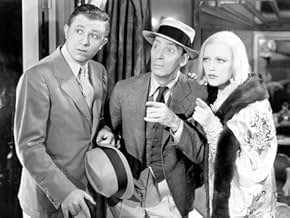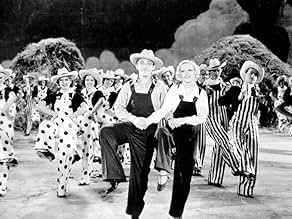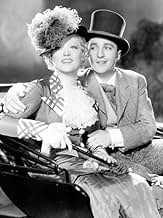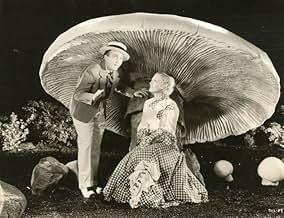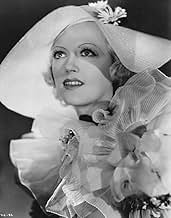A love-struck teacher pursues a radio singer to Hollywood.A love-struck teacher pursues a radio singer to Hollywood.A love-struck teacher pursues a radio singer to Hollywood.
- Director
- Writers
- Stars
- Awards
- 3 wins & 1 nomination total
The Radio Rogues
- The Radio Rogues
- (as Three Radio Rogues)
Sam Appel
- Mexican Bartender
- (uncredited)
Henry Armetta
- Henry Armetta
- (archive footage)
- (uncredited)
Eddie Bartell
- Member - Three Radio Rogues
- (uncredited)
Wallace Beery
- Wallace Beery - Premiere Clip
- (archive footage)
- (uncredited)
Clara Blandick
- Miss Perkins - Divinity Teacher
- (uncredited)
Harry Bowen
- Bartender
- (uncredited)
Nora Cecil
- Briarcroft's Teacher
- (uncredited)
Onest Conley
- Tap Dancer
- (uncredited)
Ken Darby
- Member - The King's Men
- (uncredited)
Jon Dodson
- Member - The King's Men
- (uncredited)
- Director
- Writers
- All cast & crew
- Production, box office & more at IMDbPro
Featured reviews
If you like to see the original crooner of all times and really the King of male singers. Bing was a great actor in this film along with super star Marion Davies, who was like the Marilyn Monroe during her days and even Jean Harlow. Marion Davies was also a long time friend of William Randolph Hearst, the newspaper magnet of California. Bing Crosby sings,"You were Temptation" and he must have charmed all the ladies hearts of those days. Wallace Berry, veteran actor has a brief role in this film and is uncredited along with the great Mae Clarke. This is really what Hollywood films were like in the Golden era of movies. It is a must view film.
French teacher Sylvia Bruce (Marion Davies) teaches at an exclusive boarding school for girls where all of the other teachers are decades older than she is. She's restless and dissatisfied with her sterile environment. Then one night Sylvia turns on her radio and hears crooner Bill WIlliams (Bing Crosby) singing. He makes her feel alive again, so she packs her bags and leaves the school.
Sylvia ends up on the train to Hollywood that Bill is taking as he is going to make a movie. Not only does she tell Bill how much his singing meant to her, she declares her love for him. They don't know one another, they've never even met. The best way to describe her is a weird stalker character. Even though Bill has expressed dismay at her declaration and is obviously keeping company with the French actress of the film, Lili Yvonne (Fifi D'orsay), Sylvia still pursues him.
At first she gets a job as Lili's maid. When that doesn't work out she follows him to the studio and gets a job as an extra so she can get close to him that way. In the 21st century this would be a neo-noir with creepy music to match Sylvia's creepy behavior. I would bring up "Fatal Attraction" as a comparison, but at least there Michael Douglas was initially attracted to Glenn Close's character and did make the first move.
The plot is thin in this one - there's a pedestrian radio act inserted into the middle of the film that goes on interminably, probably just to pad the running time so it gets past an hour.
What's good about it? There are several great standards sung by Bing in top vocal form - "Beautiful Girl", "Temptation", and "Going Hollywood". Ned Sparks is great as an ascerbic director. Stu Erwin is the financial backer of the film who seems to be his normal passive self until he surprisingly finds his voice late. The production values are top notch - It's just that horrible plot!
I guess that in 1933, like now, wads of cash can cover a multitude of sins, and they sure covered William Randolph Hearst's sins in thinking he knew much about the art of motion picture making.
Sylvia ends up on the train to Hollywood that Bill is taking as he is going to make a movie. Not only does she tell Bill how much his singing meant to her, she declares her love for him. They don't know one another, they've never even met. The best way to describe her is a weird stalker character. Even though Bill has expressed dismay at her declaration and is obviously keeping company with the French actress of the film, Lili Yvonne (Fifi D'orsay), Sylvia still pursues him.
At first she gets a job as Lili's maid. When that doesn't work out she follows him to the studio and gets a job as an extra so she can get close to him that way. In the 21st century this would be a neo-noir with creepy music to match Sylvia's creepy behavior. I would bring up "Fatal Attraction" as a comparison, but at least there Michael Douglas was initially attracted to Glenn Close's character and did make the first move.
The plot is thin in this one - there's a pedestrian radio act inserted into the middle of the film that goes on interminably, probably just to pad the running time so it gets past an hour.
What's good about it? There are several great standards sung by Bing in top vocal form - "Beautiful Girl", "Temptation", and "Going Hollywood". Ned Sparks is great as an ascerbic director. Stu Erwin is the financial backer of the film who seems to be his normal passive self until he surprisingly finds his voice late. The production values are top notch - It's just that horrible plot!
I guess that in 1933, like now, wads of cash can cover a multitude of sins, and they sure covered William Randolph Hearst's sins in thinking he knew much about the art of motion picture making.
Bing Crosby truly was the quintessential vocalist of his time. I strongly recommend Gary Giddins bio on Bing; an excellent reference.
Anyway, the story may be weak in this film, but the songs and Bing's clear baritone voice make up for it.
An interesting tidbit about this film: Of course Marion Davies was W.R. Hearst's mistress, and Hearst financed the film. Ms. Davies thus took full advantage of the situation by showing up for filming at 10 AM, shooting a scene or two before a four hour lunch replete with all the catered trimmings and wines. The day wound down by 4PM.
It's no wonder it took six months to shoot this film in an era when the typical film was shot in 2 weeks!
Anyway, the story may be weak in this film, but the songs and Bing's clear baritone voice make up for it.
An interesting tidbit about this film: Of course Marion Davies was W.R. Hearst's mistress, and Hearst financed the film. Ms. Davies thus took full advantage of the situation by showing up for filming at 10 AM, shooting a scene or two before a four hour lunch replete with all the catered trimmings and wines. The day wound down by 4PM.
It's no wonder it took six months to shoot this film in an era when the typical film was shot in 2 weeks!
Beautiful blonde French teacher Marion Davies (as Sylvia Bruce) quits her job to pursue radio crooner Bing Crosby (as Bill Williams) to Hollywood, where Mr. Crosby is going to star in a motion picture. In Los Angeles, Ms. Davies moves in with new pal Patsy Kelly (as Jill Barker), who thinks Davies could be a movie star "better than Norma Shearer." Good one. Davies continues to swoon over Crosby, who is only has eyes for French co-star Fifi D'Orsay (as Lili Yvonne). Which of the dueling damsels will win Crosby's heart?
A fine supporting cast, director (Raoul Walsh), and budget make this is a pleasant Bing Crosby musical masquerading as a Marion Davies movie. Two of Crosby's Brunswick 78 RPM recordings were hits: sung herein to Sterling Holloway, "Beautiful Girl" reached #11; the best film song "Temptation" went to #3; and, the big production number "We'll Make Hay While the Sun Shines" peaked at #8.
"Three Radio Rogues" singing impersonations are also highlights, with Jimmy Hollywood managing Kate Smith's "When the Moon Comes Over the Mountain" with uncanny ease. Mainly, though, it's Crosby's show.
***** Going Hollywood (12/22/33) Raoul Walsh ~ Bing Crosby, Marion Davies, Fifi D'Orsay, Patsy Kelly
A fine supporting cast, director (Raoul Walsh), and budget make this is a pleasant Bing Crosby musical masquerading as a Marion Davies movie. Two of Crosby's Brunswick 78 RPM recordings were hits: sung herein to Sterling Holloway, "Beautiful Girl" reached #11; the best film song "Temptation" went to #3; and, the big production number "We'll Make Hay While the Sun Shines" peaked at #8.
"Three Radio Rogues" singing impersonations are also highlights, with Jimmy Hollywood managing Kate Smith's "When the Moon Comes Over the Mountain" with uncanny ease. Mainly, though, it's Crosby's show.
***** Going Hollywood (12/22/33) Raoul Walsh ~ Bing Crosby, Marion Davies, Fifi D'Orsay, Patsy Kelly
'Going Hollywood's' biggest attraction was Bing Crosby, who had one of the most beautiful and distinctive male (and in general) singing voices on film, as well as being a master of how to use it.
Crosby is certainly the best thing about 'Going Hollywood'. He seems relaxed, has a lot of charm and looks and sounds wonderful, his beautiful smooth voice used with impeccable phrasing and control as always. Great songs also helps, something that 'Going Hollywood' certainly has, the standouts being the title song, "Temptation" and "Beautiful Girl".
Of the production numbers, choreographically the best is the train station sequence which is so lively and entertaining. Although Raoul Walsh did seem a bit of an odd choice at first as director, often going for the tougher and darker edge to his films, but he does direct with a light touch without being too lightweight. Really enjoyed Patsy Kelly, who brings plenty of sass and allure. While going on a little too long, the Three Radio Rogues are also entertaining, and while overlong and overblown parts of the dream sequence are quite sweet.
However, was very much mixed on Marion Davies. She is attractive and does bring some charm and fun, but at other points she does look stiff and limitations in her singing and dancing show. Stuart Erwin has an appealing earnestness but has little to do, while Ned Sparks does smarmy well but the character is written with so little variation that it feels one-dimensional. Worst of all is Fifi D'Orsay, her character being an annoying cartoonish caricature made even more insufferable by that D'Orsay overacts to such a wild degree.
While some of the dream sequence was quite nice, the dancing scarecrows part does feel really bizarre and also jars. The bit with the blackface is neither cute or funny and even those who hardly ever scream racism will find it in bad taste. The script has some wit, but is also shallow and flaccid. The story while at first lively in pace constantly feels too convenient and too neatly wrapped up, while also dragging towards the end, having a premise and romance that rarely rings true and being paper thin. Characterisation is even thinner, development practically forgotten about.
All in all, many charms but also some big caveats. 5/10 Bethany Cox
Crosby is certainly the best thing about 'Going Hollywood'. He seems relaxed, has a lot of charm and looks and sounds wonderful, his beautiful smooth voice used with impeccable phrasing and control as always. Great songs also helps, something that 'Going Hollywood' certainly has, the standouts being the title song, "Temptation" and "Beautiful Girl".
Of the production numbers, choreographically the best is the train station sequence which is so lively and entertaining. Although Raoul Walsh did seem a bit of an odd choice at first as director, often going for the tougher and darker edge to his films, but he does direct with a light touch without being too lightweight. Really enjoyed Patsy Kelly, who brings plenty of sass and allure. While going on a little too long, the Three Radio Rogues are also entertaining, and while overlong and overblown parts of the dream sequence are quite sweet.
However, was very much mixed on Marion Davies. She is attractive and does bring some charm and fun, but at other points she does look stiff and limitations in her singing and dancing show. Stuart Erwin has an appealing earnestness but has little to do, while Ned Sparks does smarmy well but the character is written with so little variation that it feels one-dimensional. Worst of all is Fifi D'Orsay, her character being an annoying cartoonish caricature made even more insufferable by that D'Orsay overacts to such a wild degree.
While some of the dream sequence was quite nice, the dancing scarecrows part does feel really bizarre and also jars. The bit with the blackface is neither cute or funny and even those who hardly ever scream racism will find it in bad taste. The script has some wit, but is also shallow and flaccid. The story while at first lively in pace constantly feels too convenient and too neatly wrapped up, while also dragging towards the end, having a premise and romance that rarely rings true and being paper thin. Characterisation is even thinner, development practically forgotten about.
All in all, many charms but also some big caveats. 5/10 Bethany Cox
Did you know
- TriviaWhen Marion Davies requested Bing Crosby as her leading man for this film, he was under contract to Paramount, where they had him starring in shorts and a series of college themed films with Jack Oakie. The success of this film moved Crosby into starring roles at Paramount with the likes of Carole Lombard and Miriam Hopkins, a definite step upwards.
- Quotes
Bill 'Billy' Williams: [singing] Out where they say, "Let us be gay," I'm going Hollywood. I'll ballyhoo greetings to you, I'm going Hollywood. Hey, while you sleepyheads are in that hay, I'll be dancing - I'm gonna be dancing with a sun-kissed baby. And I'm on my way - here's my beret, I'm going Hollywood!
- ConnectionsEdited into The Big Idea (1934)
- SoundtracksGoing Hollywood
(1933) (uncredited)
Music by Nacio Herb Brown
Lyrics by Arthur Freed
Played during the opening credits
Sung by Bing Crosby at the railroad station
Played as background music twice
Details
- Release date
- Country of origin
- Official site
- Languages
- Also known as
- Going Hollywood
- Filming locations
- Production companies
- See more company credits at IMDbPro
Box office
- Budget
- $914,000 (estimated)
- Runtime
- 1h 18m(78 min)
- Color
- Aspect ratio
- 1.37 : 1
Contribute to this page
Suggest an edit or add missing content

